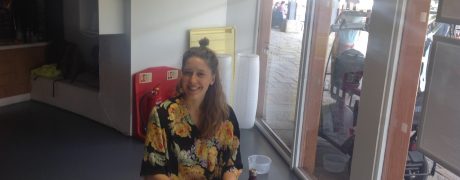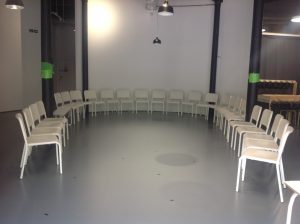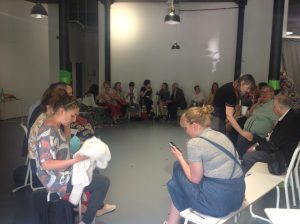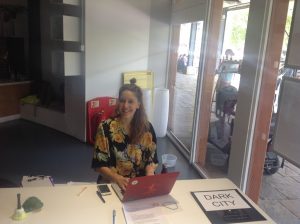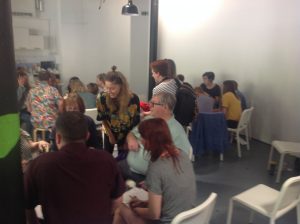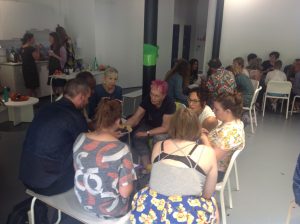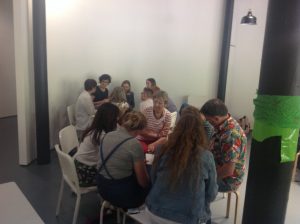PECo Theatre’s final Dark City session took place on 23rd May.
It was such a special event and we are very grateful to everyone who attended for being so generous with their time and being open and honest about their unique situations as individuals, venues and organisations.
We were pleased to be hosted by Watershed through our residency at the Pervasive Media Studio and of course thanks go to the project’s funders ACE, BAB and the Quartet Fund.
It was a packed 2 hours expertly facilitated by Emma Hughes; Dark City outreach producer, that was peppered with poems about the VI experience written and performed by our core Dark City collaborators and saw inputs from a number of arts and culture organisations in the city including; Colston Hall, Knowle West Media Centre, Bristol Old Vic and City Museum and Art Gallery.
There were also inputs from VI charities and advocacy organisations Vision West of England and Sight Loss Council who both gave a run down of the work they are doing in the city to raise the profile of VI and provide more activities, resources and support for VI people.
One of the projects core funders, Bristol Ageing Better’s Bianca Rossetti, also gave an input about their progress in making Bristol an age and VI friendly city.
PECo’s own Rachel Aspinwall and Holly Thomas spoke about the artistic learning from the Dark City R&D so far and Emma Hughes presented the compiled findings collated from information gathered at previous Dark City outreach sessions, outlining opportunities and resources for people living with a visual impairment in Bristol.
You can access these compiled findings here.
We then broke into small discussion groups comprising individuals from the VI community and wide range of artists and arts and culture organisations and companies, to come up with action points for next steps towards raising our collective game in relation to VI.
Below is a summary of the action points that were shared at the end of the session, we share them here in order to inspire others to consider the various ways we can all be improving our offer for VI people.
A hugely positive action that came out of the meeting was an offer from Alun Davies of the Sight Loss Council to facilitate a regular Arts and Culture VI forum to allow people to continue to work together and get actions underway.
If you would like to be kept informed about developments for this please send an email to Alun Davies, Engagement Manager, Pocklington Trust; alun.davies@pocklington-trust.org.uk
Action points from meeting:
Participation + programming
Think about commissioning and programming VI artists and involving VI people in arts activity – this is not just about access
Remind theatre companies and producers to involve VI people from the very beginning of their process rather than as an add on at the end
Consider light levels of performance and activity times (important to offer matinee performances/daytime activities)
Bone conducting headphones may be better for VI participants, audience members and artists as you are still able to hear what’s going on in the room whilst wearing them
Accessing information
Give people enough time to read and hear material in advance
Cultural information could be shared at places like the eye hospital
There should be one designated place to access information – please share events and opportunities with Marc Gulwell to share with VI networks on the Vision West of England website and newsletter –marc.gulwell@visionwofe.org.uk – and Alun Davies to share with Pocklington Trust’s Sight loss Council, see email above.
Consider different marketing tools such as talking flyers
‘Penfriends’ are a good assistive tool to have in venues as a link between those who can’t see and those who can hear.
there is an app that offers to map your venue for you to make it accessible to VI – UCAN-GO app
City-Wide Approach
Complimentary tickets for companions
Creating a city-wide terminology
Arts and cultural venues and organisaions getting together every few months and talking about what we are doing
Make VI access and inclusion integral to design of projects and exhibitions from the very beginning
General
Be inclusive of deafblind community (Deafblind UK), especially when communicating emergency procedures
Check Audio Describe headsets are working before handing them out
Ring-fence money for access
Consider difficulties of glass doors
Having people to meet and greet at the door will help and improve experience of all visitors
Take risks, do different things, use imagination, think of it as an opportunity to have fun and be creative!
